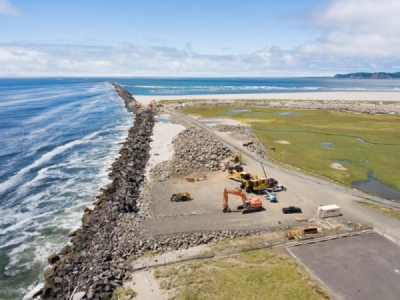
Posted on September 8, 2020
HAMMOND — Congressional representatives from Oregon and Washington state turned out Monday to tout the massive economic impact of a four-year, nearly $150 million rehabilitation of the South Jetty.
The project will cap a nearly decadelong investment of more than $250 million to secure access to a Columbia River shipping channel that facilitates an estimated $20 billion in commerce a year. In the background of the project was the continuing need for more maintenance support for smaller Pacific Northwest waterways.
The three rubble-mounted jetties at the mouth of the Columbia River were built on large sand shoals between 1885 and 1939 to provide safer passage between the Pacific Ocean and the river.
In the first phase of rehabilitation, the U.S. Army Corps of Engineers completed a $30 million rebuild of Jetty A, an inner structure near Washington’s Baker Bay. In the second, the Army Corps spent $80 million putting nearly 200,000 tons of rock into the North Jetty protruding from Cape Disappointment.
The largest and final phase will strategically place about 400,000 tons of rock along the 6-mile South Jetty over the next four years for nearly $150 million.
U.S. Sen. Ron Wyden and U.S. Rep. Suzanne Bonamici — Democrats of Oregon — stood side by side with U.S. Rep. Jaime Herrera Beutler, a Washington state Republican, to extol the benefits of the project to the region.
“They’re not just rocks in the water,” Wyden said. “They are linchpins for navigation. Without those jetties … we cannot have big league quality of life and job creation. It just simply doesn’t happen.”
After hearing from the U.S. Coast Guard that the strength of seven Hurricane Katrinas batters the jetties each year, Herrera Beutler said, there was no putting their rehabilitation on the back burner.
“I have 15 public ports all up the inland,” the congresswoman said. “And most people don’t even necessarily know what’s happening. They don’t see it. It’s not on their top-of-mind consciousness. But it is so integral to our way of life.”
Big rocks
The project takes in rock quarried from northern Washington and southern Oregon. It’s barged to Clatsop Spit from Bellingham and South Bend before being trucked to the construction site. Before the federal lawmakers stood a massive, $4 million excavator custom built to carry up to 40-ton rocks down a gravel road, with an arm long enough to reach all sides of the jetty.
The placement of every stone has been digitally mapped to provide the tightest fit to withstand the pounding waves of the ocean. The Army Corps estimates the jetties’ rehabs will last anywhere between 25 and 50 years.
J.E. McAmis, which recently completed the rehab of the North Jetty, is also the general contractor on the Oregon side. The South Jetty rehab directly employs around 75 people delivering and placing rock, said Aaron Anderson, the company’s marine superintendent.
Getting the jetties rehabilitated was one of the top priorities of the Pacific Northwest Waterways Association, which has long stumped for the project in Congress. But it was far from a cakewalk, said Kristin Meira, the association’s executive director.
“This one had to compete against channel-deepening projects in other parts of the country, places where they’re wanting to move bigger ships and really marquee projects,” she said. “We’re very proud of how everyone on the river system came together to tell the story of these jetties.”
Harbor maintenance
Another top priority for the waterways association and many in Oregon’s congressional delegation is getting Congress to make available the estimated $9.3 billion in the Harbor Maintenance Trust Fund, funded by shipper and cargo taxes, as a stimulus for ports needing relief.
“Once you get past the mouth of the Columbia River and you talk about some of those smaller coastal ports, they have a real struggle getting the funding that they need,” Meira said.
The House late last year passed the Full Utilization of the Harbor Maintenance Trust Fund Act, introduced by Rep. Peter DeFazio, an Oregon Democrat, to release the trust fund to cover up to 100% of eligible operations and maintenance costs for commercial channels and harbors. The bill passed the Democrat-controlled House with Republican support, including Herrera Beutler.
But the bill faces tougher prospects in the Republican-controlled Senate, where Wyden is ranking member of the Senate Finance Committee and fellow Oregon Democratic U.S. Sen. Jeff Merkley is a member of the Senate Appropriations Committee.
“I feel we’re well-positioned,” Wyden said. “We’re going to be all in. Part of the reason I’m being a little bit cautious is that maybe (Senate Majority Leader) Mitch McConnell comes back there and doesn’t want to do anything in September, in which case maybe a lame duck session.”
Source: dailyastorian





